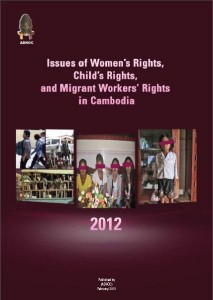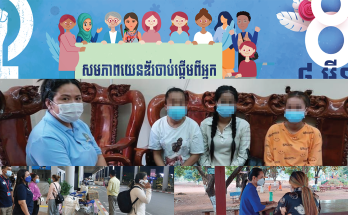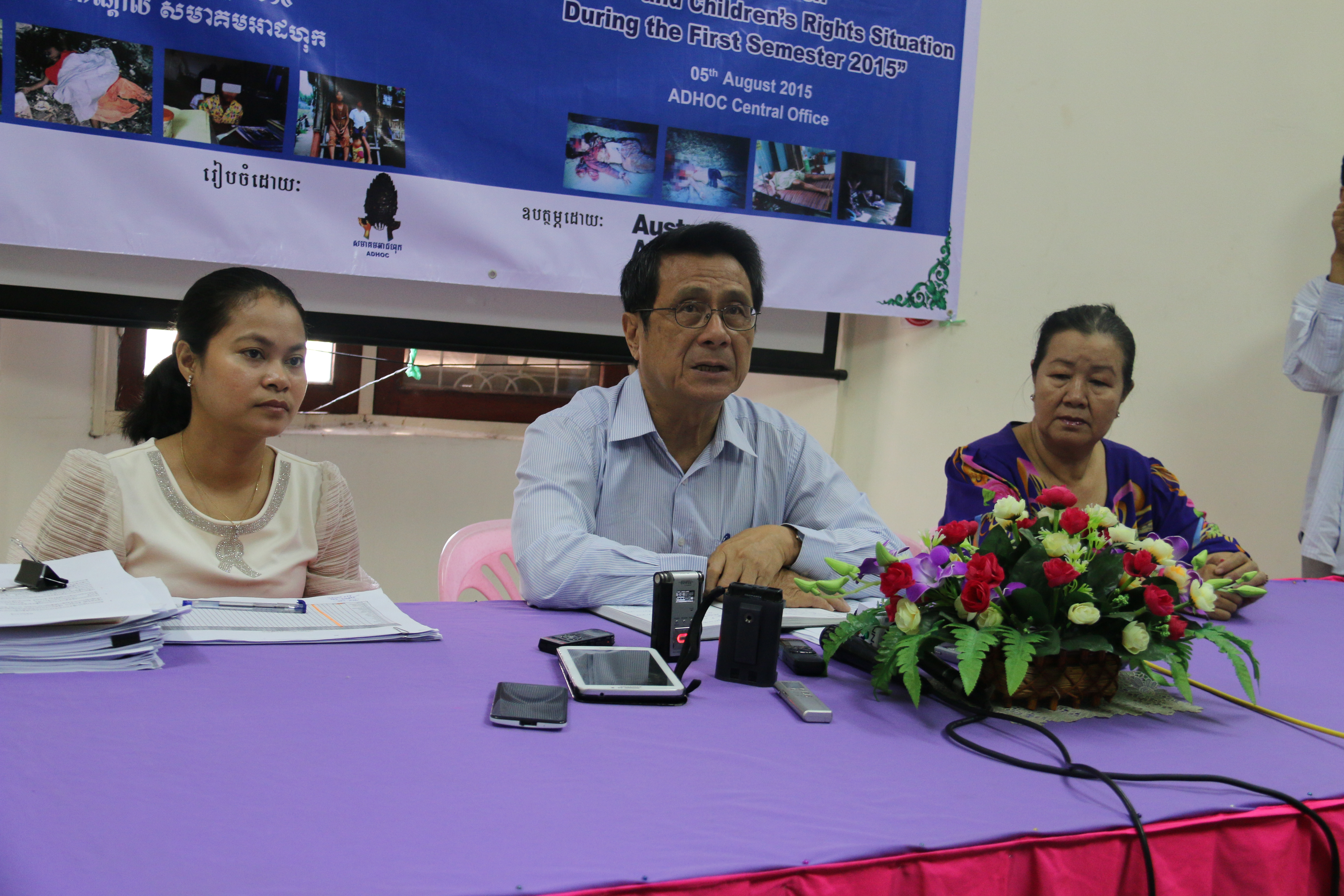 This report presents ADHOC’s findings on issues related to women’s, children’s and migrant workers’ rights in Cambodia. It outlines four key challenges associated with these rights, based on the statistics gathered by ADHOC staff in 23 provinces/municipalities and information from other organizations documenting rights violations in Cambodia. The four key challenges are: domestic violence, rape, human trafficking, and abuses of migrant workers. The analyses featured in this report are by no means exhaustive, since issues and abuses that affect women children and migrants are numerous. However, this report analyzes the context and the problems encountered by those who work to promote and protect these rights throughout the country.
This report presents ADHOC’s findings on issues related to women’s, children’s and migrant workers’ rights in Cambodia. It outlines four key challenges associated with these rights, based on the statistics gathered by ADHOC staff in 23 provinces/municipalities and information from other organizations documenting rights violations in Cambodia. The four key challenges are: domestic violence, rape, human trafficking, and abuses of migrant workers. The analyses featured in this report are by no means exhaustive, since issues and abuses that affect women children and migrants are numerous. However, this report analyzes the context and the problems encountered by those who work to promote and protect these rights throughout the country.
Domestic violence is a problem embedded in many societies. In Cambodia, the tradition of men being systematically considered heads of the household is one of the causes of domestic violence. Based on ADHOC’s investigation and monitoring activities, in 2012 at least 1,089 women and children were victims of domestic violence. In many cases there was violence over a long period of time, as well as psychological abuse. Factors contributing to the prevalence of domestic violence included: poverty, stress linked to landlessness, drug and alcohol abuse and gambling. Abuses led to a number of suicides and shocking murders, with husbands killing their wives, children killing their fathers and wives killing their husbands. Some of these killings occurred in a particularly brutal manner, with instances of bodies cut into pieces—which had never happened before—and acid thrown on victims.
As a result of domestic violence, family members live in disharmony. Children were badly affected, sometimes leaving the family without knowledge of the potential dangers they could face. In some cases, children became the victims of human trafficking and/or got involved with drugs, gambling, theft and robbery.
Sexual violence remained a significant concern in 2012. Victims of sexual violence included men, women, very young children and elderly and disabled people. About 70% of the perpetrators were neighbors, acquaintances, fathers or step-fathers, but there were also workers, students, teachers, monks and youths. Factors contributing to acts of sexual violence included drug or alcohol abuse among perpetrators, mental illness, domestic abuse and social insecurity. Other factors include the environment in which children and youth grow up and social relationships which undermine the position of women and children—gender stereotyping is commonplace in Cambodia, as well as the repeated failure of state authorities to punish those who commit these crimes.
Human trafficking mostly happened in the form of labor trafficking. Human trafficking in Cambodia is primarily due to socio-economic factors such as unequal distribution of wealth, poverty, loss of agricultural land and lack of employment opportunities. The problem is exacerbated by the fact that there is little public information available on the dangers of trafficking. Moreover, prevention and protection measures are limited, as is the capacity of authorities to enforce the law. Victims easily find themselves in debt and often end up working in slave-like conditions as housemaids, on fishing ships, or in agro-industrial businesses. Many victims have been physically and psychologically abused, and in some cases were forced into prostitution. 94% of the men who were victims of labor trafficking had been persuaded by brokers that they would receive a high salary and that working conditions would be good. Some of them were sent through recruitment agencies to work abroad. For instance, fishermen were sent to Fiji, South Africa, China, Singapore and Micronesia, despite the fact that Cambodian law limits migrant workers’ destinations to Malaysia, Thailand, Japan and Korea. The majority of victims of sexual trafficking were women and young girls, who were convinced by brokers to get married in order to migrate to other countries. They were often promised jobs in urban areas like Phnom Penh, Koh Kong and Kampong Som. Sometimes, they were illegally sent abroad across the border via the Koh Kong corridor and sold to nightclubs, hotels or massage parlors.
Violations of the rights of migrant workers—both legal and illegal—increased up to 200% in 2012 as compared to 2011. 73.7% out of a total of 468 female migrant workers ADHOC assisted suffered from severe rights violations. In 2012, the total number of cases of abuses of migrant workers’ rights handled by ADHOC was 313. In 288 cases, migration was legal, with proper legal documents and through labor recruitment agencies. Because of poverty, many Cambodians left the country to work without taking the dangers into account. The major abuses included forced labor, unpaid extra-hours, overwork, inadequate rest and leisure, deprivation of health care and food, as well as beatings, torture and rape. Some migrant workers eventually ended up being trafficked to other countries. Because of this critical situation, in October 2011 the Cambodian government issued a circular suspending the recruitment and the sending of housemaids to Malaysia. Despite this circular, migrant workers still face tremendous challenges because there is no specific monitoring and grievance mechanism available to them. In particular, the recruitment agencies refuse to take responsibility for the workers sent to Malaysia. In addition, the authorities fail to closely monitor the recruitment agencies’ compliance with the law since a number of agencies/companies exert pressure on state institutions. As a result, the problems are not resolved in a timely manner.
There were at least 400,000 Cambodian migrant workers in Thailand, excluding those who migrated illegally. The latter migrated in order to seek jobs and wages to support their relatives back home, knowing that it was illegal and risky. They migrated through brokers and neighbors or in groups at night, because the labor market in Cambodia is weak and the wages are much lower than in neighboring countries. Furthermore, it is difficult to obtain proper legal documents—as the fees for a passport are high, compared to other countries. In 2012, crossing the Thai border at night was increasingly dangerous. Risks included being shot by the Thai authorities and, once in Thailand, migrants were exposed to the risk of being raped, detained or enslaved. At least 34 Cambodian citizens were shot dead by the Thai authorities as they were illegally crossing the border to conduct logging activities in Thailand.
To resolve these issues and to contribute to better protection and promotion of the rights of women, children and migrant workers, ADHOC would like to make the following recommendations:
- Strengthen law enforcement by bringing perpetrators to justice. Relevant laws include the Law on the Suppression of Human Trafficking and Sexual Exploitation, the Criminal Code, the Civil Code, the Labor Law and the Sub-decree 190 on the Sending of Migrant Workers Abroad. Law enforcement can be enhanced through the establishment of specific mechanisms and procedures and through punishment of wrongful officials, as well as through improving cooperation with civil society organizations (CSOs).
- The government, in particular the Ministry of Women’s Affairs, the Ministry of Education, the Ministry of Information and the Ministry of Labor, should increase educational and outreach activities to raise awareness and knowledge of the consequences of domestic violence, sexual abuse, sexual trafficking, human trafficking, migration for work and illegal migration, as well as prevention measures and the promotion of social morality through media outlets and school curricula, starting from the primary level.
- The Ministry of Women’s Affairs, the Ministry of Labor and Vocational Training and the Ministry of Social Affairs should increase training programs for workers, especially women, and encourage women to participate in social work or create additional domestic jobs with good conditions so as to increase income generation opportunities and local development in their communities.
- The government should strengthen law enforcement, social security and budget allocation for training human resources, providing social services, and providing free temporary shelters for victims of gender-based violence.
- Publications on issues facing women and children—with a focus on human trafficking and safe migration—should be circulated as widely as possible.
- The government, especially the Ministry of Interior, should facilitate the process of application for passports and cross-border permits, so that they are available to more people who might try to migrate illegally.
- Citizens should comply with the existing laws in order to contribute to social development, to prevent rights violations, to punish perpetrators and to pay more attention to educating children about social morality, mutual tolerance and the need to avoid using violence to resolve problems.


